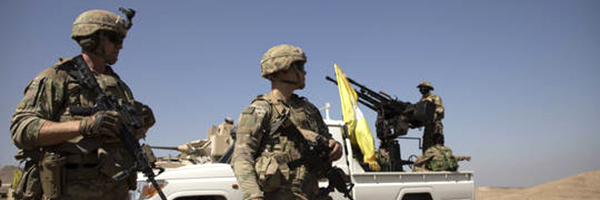US officials have some nerve in accusing Russia of antagonizing their illegal occupation force in Syria
Washington refuses to countenance exit from the country despite having no right to be there.
The US military, with the help of its Kurdish allies, occupies a third of Syrian territory with no legal basis and is now complaining about Russia antagonizing its troops. Although Moscow was invited into Syria by Damascus and the US has repeatedly been asked to leave, the Americans are treating Syrian territory as if it is their own.
US officials have recently lashed out with yet more accusations against Moscow. This time the complaints have surfaced through Western corporate media outlets such as the Wall Street Journal (WSJ). The head of US Air Forces Central Command, Lt. Gen. Alexus Grynkewich, told the WSJ that “we continue to see unsafe and unprofessional area activity from the Russians,” reportedly in proximity of US forces. No evidence has been provided for the claims and Moscow has yet to make any comment.
In July of last year, Dana Stroul, the Biden administration’s deputy assistant secretary of defense (DASD) for the Middle East, said: “Russia is flying in and moving about, at times, in the same space or terrain, near our forces, and it is the responsible, professional thing to do to make sure we have a channel to talk to each other.” She claimed this system has been in place for “a very long time” and is key in preventing misunderstandings that could “tip into an escalatory cycle.” With the presence of both forces in close proximity so frequently, there has yet to be any indication that what is being complained about now is anything new.
However, the story that is being completely written out of existence here is that the US has no legitimacy whatsoever to even operate inside Syria. The US government attempts to legally justify its presence by asserting that under international law it is a victim state in the face of non-state actors such as ‘Islamic State (IS, formerly ISIS) ISIS or Al-Qaeda. Therefore, the Authorization for Use of Military Force (UAMF) against Iraq, which was passed by US Congress in 2002, is utilized here.
The problem is that the US invasion of Iraq had no validity under international law either, a point explicitly made by former UN Secretary-General Kofi Annan in 2004. Knowing this, US government officials will always cite their invitation from the Iraqi government to operate inside the country today, sometimes attempting to attach their operations in Syria as coming in defense of their Iraqi ally. Article 2(4) of the UN Charter, an international law which prohibits the use of force against the territorial integrity or political independence of another state, completely invalidates US operations inside Syria, since the sovereign government of the nation never granted America permission to enter its territory. In fact, it has even ordered US forces to leave.
Even if you buy the domestic argument about the US fight against ISIS, an organization that has been reduced to terror cells that linger in caves for the most part, this justification also begins to fall apart when examined closely. In 2017, US Senator for Virginia, Tim Kaine, wrote to the US State Department and Secretary of Defense, expressing his concern that if the anti-ISIS mission was extended to include pursuing objectives outside combating the terrorist group, it would have no legitimacy.
In 2018, former US Secretary of State Rex Tillerson stated that he planned on maintaining an indefinite troop presence in Syria, both to fight ISIS and to combat Iran and Syrian President Bashar Assad. Even today, the US Department of Defense openly mentions that its mission in Syria and Iraq is a strategy to undermine Iran and ISIS. At one point, after former US President Donald Trump had been misled to believe that all US forces had been withdrawn from Syria, he corrected himself by saying that the US military presence there is “only for the oil.”
Interestingly, at a conference in 2019, Stroul stated that despite the lack of investment that the US was able to muster to counter Iranian and Russian influence in Syria, it still maintained compelling leverage “to shape an outcome that is more protective and conducive to US interests.”
Stroul outlined four ways that the US maintains its leverage. The first key point she made was about the territory in the north-east, which she said is “owned via the US military with its local partner,” adding that the “one third of Syria is the resource rich, economic powerhouse of Syria.” She elaborated that this is “where the hydrocarbons are” and that it is also the “agricultural powerhouse” of the country. Additionally, she stated that the strategy of isolating the government in Damascus diplomatically is in part about preventing Moscow’s efforts to re-integrate the country onto the international stage, and that US sanctions are partly attached to a wider anti-Iran strategy.
Perhaps the most shocking of all Stroul’s points was the admission that the US has only allowed reconstruction in the areas controlled by its SDF allies in occupied Syria while commenting that “the rest of Syria is rubble.” Stroul continued, “What Russia wants and what Assad want, is economic reconstruction and that is something that the United States can basically hold a card on via the international financial institutions and our cooperation with the Europeans.” In the wake of the devastating earthquake in Northern Syria earlier this year, the prevention of reconstruction has contributed significantly to civilian suffering resulting from the natural disaster.
The US Caesar Act sanctions have been blasted for years by UN experts, who have called upon the Biden administration to drop them over the “suffocating” humanitarian crisis they are inflicting on Syrian civilians. Under international law, the third of Syrian territory “owned” by the US can be argued as tantamount to an illegal occupation by a foreign military force. Given that the US military is an occupying power, Damascus has the right to use force to expel it, furthermore, since Russia has been invited into Syria by the official government, the US claims of harassment carry no weight. The United States of America has no right to claim self defense in Syria, it has only one right there – to leave and not return.

 Robert Inlakesh, RT, April 29, 2023 —
Robert Inlakesh, RT, April 29, 2023 —